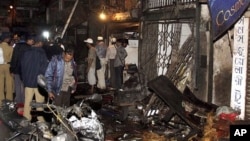Three bombs exploded in central locations in Mumbai – India’s financial capital – on Wednesday, July 13, killing at least 18 and injuring over 110. As of now, it is not known who committed these acts of violence, as no group has claimed responsibility. However, investigative teams are currently on site, and Mumbai is on high-alert.
The July 13 bombings are just the latest in a long list of terrorist attacks in India over the past decade, including the February 13, 2010 attack in Puné, which killed 17 people while injuring more than 60; and the November 26, 2008 terrorist assault on Mumbai that claimed 183 innocent lives, (including 22 foreigners, of which 6 were Americans, and 14 members of the Indian security forces), and left over 300 others, including men, women and children of many different faiths and creeds (Hindu, Muslim, Christian, Jewish, and others) injured.
U.S. Secretary of State Hillary Clinton condemned the attacks as acts of violence designed to provoke fear and division:
"Those who perpetrated them must know they cannot succeed. The Indian people have suffered from acts of terrorism before, and we have seen them respond with courage and resilience....Our hearts are with the victims and their families, and we have reached out to the Indian Government to express our condolence and offer our support."
Secretary Clinton kept her plans to travel to India this week. She is there seeking to deepen the partnership between the two countries and to reaffirm their commitment to the shared struggle against terrorism.
"India is a close friend and partner of the United States," said President Barack Obama in a July 13th statement. "The American people will stand with the Indian people in times of trial, and we will offer support to India’s efforts to bring the perpetrators of these terrible crimes to justice."
Three bombs exploded in central locations in Mumbai on July 13, killing at least 18 and injuring over 110.




